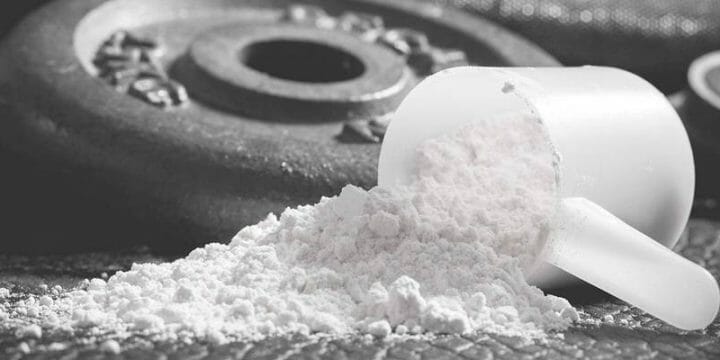As a medical doctor, I often recommend creatine supplements to my clients for muscle growth. However, some people experience creatine constipation and often ask how much water they should drink while taking creatine.
Creatine is naturally produced by your own body, and that 95% of the substance is found in your muscles.
So, why would it be necessary for some people to take the supplement, and how exactly does it cause digestive problems?
Let's find out why creatine, known for muscle enhancement, has a downside.
Quick Summary
- Creatine supplements can cause bloating and constipation, especially if you take high doses.
- The ways of avoiding constipation while taking creatine supplements are increasing fiber intake, daily water intake, decreasing dosage, and eating something before taking your creatine.
- Mixing undissolved creatine monohydrate with 10 ounces of water instead of six can prevent dehydration during supplementation.
- I believe that while creatine offers undeniable muscle growth benefits, it's crucial to approach its use with caution and awareness of potential side effects.
Does Creatine Cause Constipation And Bloating?

Yes, creatine supplements can cause constipation, bloating and weight gain for some users.
Some creatine users may experience muscle cramps and digestive system issues due to creatine intake, which may cause constipation in some cases.
Since most weight-lifters and bodybuilders take it, it’s often found in quite high doses of pre-workout supplements. And the higher the dose, the higher the chances of experiencing creatine constipation.
This is most commonly the case during a creatine loading phase, where athletes take large doses of more than 10 grams daily.
This can cause more fluid retention in the muscles, and scientists believe this water can be drawn away from other body parts [1].
Creatine pulls water from the stomach and bowels, causing constipation and bloating.
During my research on creatine, I realized that constipation isn't the only side effect related to gut health. This product might interact with our gut flora, causing an increase in vitamin, iron and calcium absorption.
Does The Type Matter?
The type of creatine seems to not matter in the context of constipation, as I couldn’t find clear scientific evidence that different forms of undissolved creatine cause more or less severe muscle cramps and constipation.
I checked with other colleagues and they confirmed that people are most likely taking creatine monohydrate.
The medical industry also highlights this form of supplementing creatine as having stomach upset as a dose-dependent side effect [2].
Why Do You Have To Drink A Lot Of Water With Creatine?

You have to drink a lot of water with creatine because it can drain fluid from other parts of your body to bring it to muscle cells.
This makes muscle cells swell up more and is a natural response, especially during a creatine supplementation loading phase [3].
This can lead to minor dehydration in other parts of the body and is the main reason I would advise you to mix undissolved creatine monohydrate powder with 10 ounces of water rather than six ounces for many other supplements.
Are There Ways To Avoid This Constipation?

Yes, there are ways to avoid creatine constipation that will allow you to achieve great muscle mass growth without this uncomfortable downside. Here are just a few:
Increased Fiber
Aim to add more fibre-rich food to your diet, especially in the meal closest to your workout sessions. Fibre is a substance that turns into a gel in the stomach and lubricates your bowels for more efficient digestion [4].
Better Timing
While some athletes like taking creatine on an empty stomach, this could be the kind of timing that results in constipation. Creatine monohydrate powder pulls water from all possible sources, so aim to take it with a meal or light snack.
Decreased Dosage
If you’ve encountered constipation while taking creatine supplementation, then consider reducing the dosage for a few days. Take half the amount you have been and see if this reduces the symptoms.
Daily Water Intake
And finally, start drinking a lot more cold water every day. I would suggest adding an extra 20 ounces throughout the day, but especially around the time you start your strength training. This also gives you more benefits from an overall hydration level for exercise [5].
“A good guideline to use when preparing for an outdoor workout, whether it's walking, running, biking, or tennis, is to drink about two cups of fluid two hours before the activity. That helps make sure you are well-hydrated before you ever go outdoors.”
- Kathleen M. Zelman, MPH, RD, LD WebMD.com
FAQs
Can You Take Creatine Supplementation on an Empty Stomach?
Yes, you can take creatine supplementation on an empty stomach. This can help with faster absorption before a training session, but you should increase your water intake at the same time.
Does Taking Creatine Help Digestion?
No, taking creatine doesn’t help digestion. Its main purpose is tied to how muscle cells process raw energy, making it a bit easier to train harder, improve athletic performance, and speed up muscle growth.
References
- https://www.ncbi.nlm.nih.gov/pmc/articles/PMC155510/
- https://www.webmd.com/vitamins/ai/ingredientmono-873/creatine
- https://my.clevelandclinic.org/health/treatments/17674-creatine
- https://www.webmd.com/diet/features/fiber-digestion
- https://familydoctor.org/athletes-the-importance-of-good-hydration/
About The Author
You May Also Like






